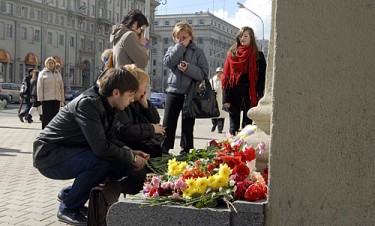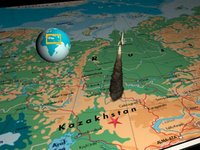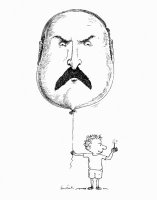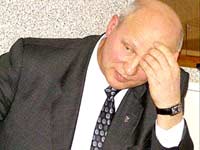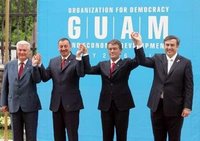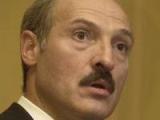 Should a foreign minister be allowed to blog? This has been a burning issue in the Swedish media and blogosphere this year. The blog in question, Carl Bildt's Alla dessa dagar, is a personal weblog, describing the daily chores and reflections of his life as foreign minister. His critics, mostly representing traditional media, hold that this sort of one-way-communication belittles the critical role of media, and that Bildt runs Sweden's foreign policy through a blog.
Should a foreign minister be allowed to blog? This has been a burning issue in the Swedish media and blogosphere this year. The blog in question, Carl Bildt's Alla dessa dagar, is a personal weblog, describing the daily chores and reflections of his life as foreign minister. His critics, mostly representing traditional media, hold that this sort of one-way-communication belittles the critical role of media, and that Bildt runs Sweden's foreign policy through a blog.
That Bildt is next to the only prominent Swedish blogger, who regularly writes about Eastern Europe, is a little recognised fact. With a life-long commitment to regional issues, support for the independence of the Baltic States in the early 1990s, and role as EU mediator in former Yugoslavia, Bildt has insights and

knowledge in this area unique to Swedish politics. Regrettably, and in contrast to his dormant
Bildt Comments, his current Swedish-language blogging efforts at
Alla dessa dagar are but daily notes dotted down in the margins of a life as a travelling salesman in foreign policy, and lack the clear views and analysis that he previously provided his readers with. It would probably have been much more interesting if Bildt's critics had been proven right, viz. that he would actually run Swedish foreign policy through a blog. Instead, it might seem that Bildt has fallen victim to the
noblesse oblige of his office, by self-imposed censorship. The truth of the matter may, however, be much closer at hand: As foreign minister, life is simply too demanding to write analytically in the precious little spare time available.
In comparison to the
2006 review of Swedish blogs on Eastern Europe, Bildt is one of the few bloggers remaining. Only about half of the blogs in the 2006 survey are still active. On the positive side though, the number of Swedish East Europe bloggers has expanded, including some very promising new blogs, forming potential nuclea of blog clusters. The evolving pattern is thus a division into media, politcal, Slavophile, organisational, and expat blogs.
A decisive point for the expansion of the issue specific blogosphere was probably the October 2006 murder of Anna Politkovskaya. The leading Swedish evening paper,
Aftonbladet, intensified
coverage on Russia, and started cooperating with
Novaya Gazeta. Recently, some experiments have also been made with blogging, by Johanna Melén's
Moskva direkt, and one might expect this to become a recurrent feature of reporting.
The most regionally initiated blogger among Swedish journalists is indisputably Kalle Kniivilä of

the
Sydsvenska Dagbladet daily. He regularly posts stories, mainly about politics, in Swedish, Finnish, Esperanto, and Russian at his blog
diVERse. Kniivilä's enthusiasm for his subject clearly shines through, and despite clear and strong views, he delivers a reasonably balanced coverage. The only downside of it is that you never know which language to expect, potentially discouraging regular reading. Still, it is definitely worth the effort.
Another journalist blogging about Russia is Sylvia Asklöf of
Barometern-OT daily. She regularly blogs in Swedish at
Sylvanien - a title obviously alluding to both her own name and the subjects she covers. The intention is to deliver her own reactions to our time, developments in Russia, and some tidbits about Swedish politics. By blogging, she shares her reflections and experiences of some 15 years as a russophile.
An infant Swedish East European blog cluster is the
political, totally dominated by liberals. With the
Swedish International Liberal Forum (SILC) as a base, a number of blogs about the region have been started. The first was

Tobias Ljungvall's blog on Belarus, which regrettably closed down about a year ago. Instead, SILC activities have given rise to e.g. Amanda Lövkvist's blog
Lindrig huliganism (Swedish), which main focus is on the situation of the Russian liberal opposition. Lövkvist - as was the case with Ljungvall - had also a book published by
SILC on the topic of her blog. It also seems Amanda is running a blog in Russian called
olydiagron, with views from Stockholm and St. Petersburg.
Another liberal in the blogosphere is Andreas Ribbefjord, with
Andreas's Blog on Russian and Swedish foreign policy and current affairs. Coverage on Russia is, to a great extent, based on experiences from cooperation between the Swedish liberal party and its Russian counterpart
Yabloko and the dissenters' movement.
Similar to both the political and media blogs are a few Slavophile blogs, which often offer interesting views and insights. Mi Lennhag

at
demo.se provides really good coverage of Eastern Europe with a focus on Russia. Anna-Maria Norman posts various pieces on the Ukraine at
en salig blandning, and currently also runs a summer 2007 Ukrainian travelogue -
ukraina 2007 - with her friend Hanna Söderbaum. Norman has both commitment to and insight into the Ukraine, which hopefully will encourage her further publishing efforts. A recent Slavophile addition is blogger Bjolso, who writes about politics and society at
Ett annat Ryssland and about music at
Russian music video blog.
The third tendency is that
organisations and institutions dealing with the region are beginning to discover the blog media. Already last year, the
Swedish Union of Journalists used
Fredrik Nejman's Ukraina-blogg to cover a cooperation project with its Ukrainian counterpart. Now, as this cooperation seems finalised, its

blog will probably go into hiatus. An NGO-activist, Swedish Amnesty Russia coordinator, is Johanna Lärken, who runs
Med blicken mot öster, which regularly presents views and reflections on Russian politics and civil society. Also, Gunilla Lindberg - a member of the
Swedish-Polish Association - publishes
Bulletinenbloggen, as a complement to a Swedish-Polish online journal. A nascent Polish exile blogger community is also discernible, revolving around the foremost Swedish expert on Polish politics, Jakub Święcicki. At the
Święcicki blog, he writes about politics and society - currently Poland under the reign of the Kaczyński twins. Politics, culture, and society are also the subjects of choice for other bloggers in this promising group of Polish exile
kulturnye and intellectuals. Furthermore, the special Swedish system of adult education - the
Folk High Schools - leaves its imprints on the blogosphere by Ove R. Eriksson's blog
Eurasia Studies, reflecting on the experiences of East European studies at
Österlens folkhögskola. The organisational category may also include Göran Dalin's
Allt om Georgien - a hub for the Georgian diaspora community in Sweden - covered already in last year's review.
Then, there are the expat blogs. A blogger already known to many interested in the area is Erik

Petersson's
Dushanbe Pictures, which is still going strong in contrast to his Moscow blog
Samtidigt i Moskva that seems to have gone into indefinite hiatus. With
Dushanbe Pictures, Petersson regularly posts pictures from Tajikistan, and his photos are really worth seeing. The Central Asian perspective is complemented by a Caucasian, with C-G Erixon's
CG Bloggin' - until recently based in Abkhazia.
Among the seniors of Swedish East European bloggers is Murmansk-based Wictoria Majby's
Ryska Rövarhistorier, which after a period of hiatus, has recently resumed posting Russian cock-and-bull stories. A welcome addition is
A Russia of my own, by Josefina - an aspiring writer based in Yekaterinburg. Writing in English, she posts stories and reflections from a provincial perspective of the Russian Urals, with the motto "Ambition mixed with vodka gets me up in the morning." However, she is not exclusive among regional reporters.
Erik i Ryssland is a Swedish expat who has been living in and reporting from Rostov-na-Donu ever since 2005.
Turning to the big cities, another fine newcomer is
Expat i Ryssland by female boxer Anna Ingman, who blogs about a training-existence in St. Petersburg. She also contributes with regular chronicles to the
Västerbottens-Kuriren daily.
Guran i Moskva and
Thomas i Moskva are two blogs by Swedish teachers,

telling about life and school in Russia. Furthermore,
Kina i Moskva blogs about experiences and fashion in the Eastern metropolis. Turning west,
Mats i Warszwa writes about his endeavours in the Polish capital. Last but not least, Sweden has - for the last year - had a welcome visit by one of the long-standing Russia bloggers, namely American expat
Megan Case. Her unpretentious and down-to-earth accounts of life in Russia have gradually developed into an indispensable component of the expat Russia blogosphere, and she has also recently started blogging in Russian at
американка, к сожалению.
To sum up, the Swedish blogosphere on Eastern Europe is undergoing expansion and some of the necessary stabilisation to form the dynamic density needed for a blog community. What is also positively surprising is that the number of women blogging about Eastern Europe equals that of the men, which seems an exception to the international East European blogosphere. A disadvantage for the international audience is that blogs, with few exceptions, are in Swedish. For Swedish bloggers though, the domestic audience seems larger than the international, even when blogging about events and phenomena taking place abroad.
As for contents, it is obvious that the Swedish blogosphere on Eastern Europe is much more Swedish than it is East European. For better or for worse, much of it reflects both the norms and values of Swedish society, and its views and perceptions of Eastern Europe. This is especially so when it comes to Russia blogging, where the idealistic often takes precedence over the realistic, which may prove dubious in the long-run, as Swedish views and Russian realities become too divergent. Still, despite this caveat, the Swedish blogosphere on Eastern Europe seems to meet with a bright future - a situation unforeseen but a year ago.




